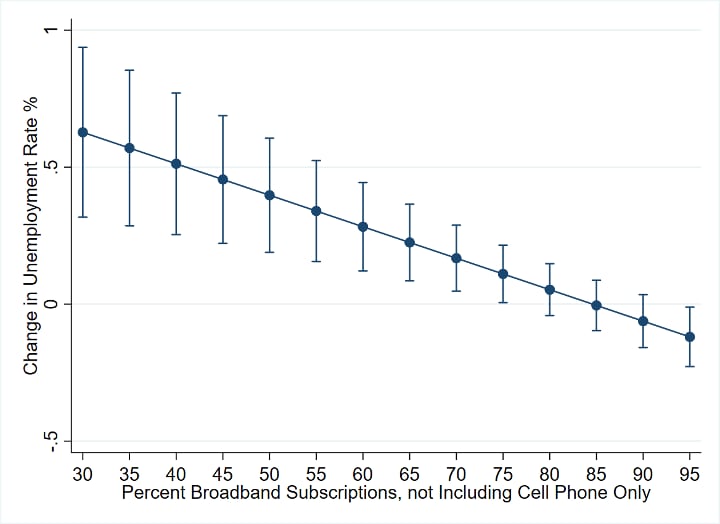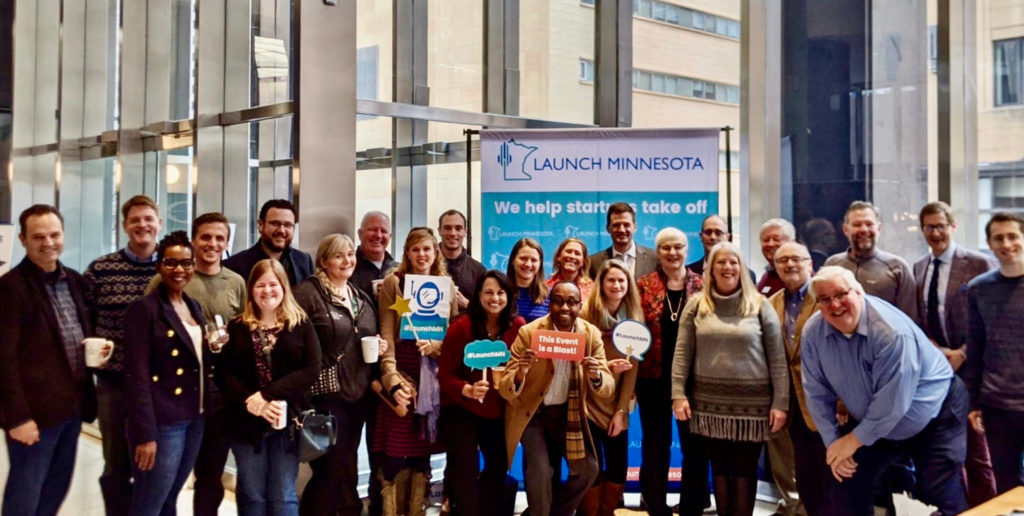
Venture, broadband adoption, and unemployment in the COVID-19 era- A data team update
Research overview
Venture, broadband adoption, and unemployment in the COVID-19 era- A data team update

The Venture Forward data team has been working with our academic partners on new and exciting time series approaches to understanding the impact of ventures on unemployment both before and during the COVID-19 pandemic. A time series approach means we are arranging our data in a way that allows us to more robustly model change over time. Each row in the dataset represents one unit of analysis within a particular snapshot of time. For example, in a recent analysis of US county unemployment rates spanning 19 months (Jan. ’19 – July ’20), each county in our dataset had 19 rows of data, 1 for each month, across 3,200+ counties, resulting in more than 60,000 total observations. Structuring our data this way allows us to gain more causal leverage as well as make better use of the variation in our data over time.
Through our academic partners at University of Iowa and UCLA Anderson Forecast, we have uncovered some important findings regarding the impact of ventures, often known as microbusinesses, and everyday entrepreneurs. We already know from prior work that ventures have beneficial impacts on a variety of economic outcomes, including increase in household median income, recession recovery, and overall community employment rates. We now wanted to know whether time plays a role in mediating or enhancing these effects, and whether the effects change in any way once temporal variation is accounted for.
In short, our collaborative efforts have uncovered three important facts around microbusinesses driving employment activity:
- Research found that every entrepreneur in a community means 2 or more jobs in that community.
- Looking at the economy in the last couple years prior to COVID-19 (Jan ’19- Feb ’20) ventures had an independent effect on unemployment rates, regardless of broadband adoption rates, meaning an additional 1 venture per 100 people in a county led to a roughly .05% (percentage point) drop in the county’s unemployment rate;
- However, in a COVID-19 world (March ’20- July ’20) broadband adoption conditions the effect, i.e. is necessary to offset unemployment. Areas with broadband adoption rates above 75% can reduce unemployment by .2% with an additional 1 venture per 100 people. Meanwhile, communities with under 75% broadband adoption do not see this effect of reduction, although they would see unemployment rates slow down. The hypothesis is that broadband adoption allows for the creation of a marketplace, and supply and demand, so areas with low adoption can’t connect microbusinesses with respective customers locally, so aren’t able to do business and thrive.
See figures 1 and 2 below for predicted unemployment rates from the pre-COVID model, and conditional marginal effects of venture density on post- COVID unemployment, varying broadband adoption rates.
Figure 1: Predicted Level of Unemployment as Venture Density Increases January 2018-February 2020, County-Level

Figure 2: Effect of Adding 1 Microbusiness on Unemployment Rates March 2020-July 2020, as Broadband Subscriptions Increase, County-Level

More Profiles & Use Cases

Making the most of Miami’s microbusiness economy
By melding policies to lure Silicon Valley–style tech companies and help existing microbusinesses grow, the city can create a better, more equitable future for all
Read the article entitled “Making the most of Miami’s microbusiness economy”
A restaurant supplier’s creative approach to thriving during the pandemic
How a fish wholesaler moved online to reach a new market, selling high-quality seafood out of a truck
Read the article entitled “A restaurant supplier’s creative approach to thriving during the pandemic”
Minnesota rethinks how it supports entrepreneurs and businesses
Neela Mollgaard, executive director of Launch Minnesota, has ideas that can help
Read the article entitled “Minnesota rethinks how it supports entrepreneurs and businesses”
A Miami tap dancer dreams of an entrepreneurial future
With her online store, Natasha Williams aims to change the way women wear press-on nails
Read the article entitled “A Miami tap dancer dreams of an entrepreneurial future”